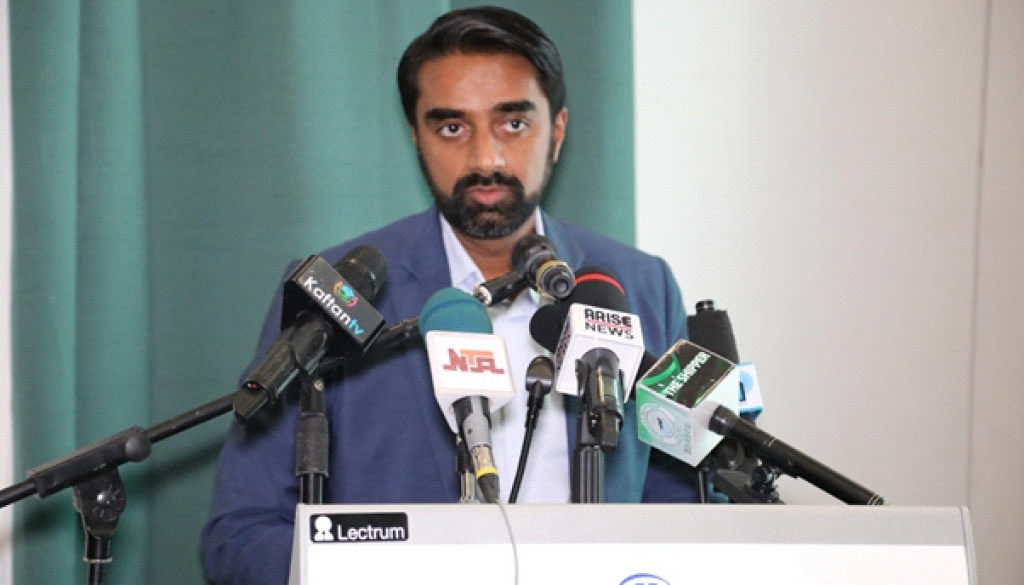VOL4- Calabar and Port Harcourt Integrity Alliance Launched

Following the successful launch of the Integrity Alliance in Lagos on 21 September 2021, the Calabar and Port Harcourt Chapters of the Alliance were launched on the 21st and 26th of October 2021 respectively. While the Calabar event had 48people in attendance, the Port Harcourt launch attracted a total of 77 participants.
The BAAC integrity Alliance is an initiative that brings together like-minded individuals in the private sector who are passionate about driving efficiency in the Nigerian ports. The membership consists of players in the Nigerian maritime sector.
Mr Emmanuel Bosah, Programme Director Integrity Organization in his welcome remarks at both event observed that the Integrity alliance was launched to support reforms by building a proactive voice to improve transparency, accountability and operation efficiency at the ports. Also, the Alliance he said offers an opportunity for increased engagement and relationship strengthening with relevant ports and regulatory authorities to address the challenges in the maritime sector as well as enable port users to demand, track, and ensure greater compliance in Nigerian ports, help strengthen government capacity to establish compliance systems, and strengthen collaboration between business, government and civil society.
Mr Moses Fadipe, Director Nigeria Shippers Council (NSC) representing the Executive Secretary Nigeria Shippers Council (NSC), Mr. Jimoh Oladapo Sulaiman, Assistant Commissioner representing the Chairman of the Independent Corrupt Practices and Other Related Offences Commission (ICPC) and Mr Ewache A. Victor , Deputy Director Federal Ministry of Transportation representing the Honourable Minister of Transportation all delivered keynote addresses at the Calabar event.

group photograph with the members of the MACN Project Steering Committee



At the Port Harcourt event, Mr Moses Fadipe, Director Nigeria Shippers Council ( NSC) representing the Executive Secretary Nigeria Shippers Council (NSC), Mr. Jimoh Oladapo Sulaiman, Assistant Commissioner representing the Chairman of the Independent Corrupt Practices and Other Related Offences Commission (ICPC), Mr. Solomon D Zaks, representing the Federal Ministry of Transportation and Mr Easton Tuti, representing Nigeria Maritime Administration and Safety Agency (NIMASA) all delivered keynote addresses.
The technical session that followed in Calabar featured presentations on The impact of the User Experience Diary training on the Nigeria Maritime Industry by Martin Benderson Associate Director, Maritime Anti-Corruption Network (MACN), Challenges faced in the Maritime Sector and Issues Relating to Infrastructural Problems Within the Sector by Deputy President Calabar Chambers of Commerce and Industry (CCCI) Mr David Etim, Challenges Faced in the Movement of Imported Goods from the Port to the Warehouse by Assistant Manager Bright Flow Logistics- Mr Kingsley Oguma, Challenges Faced with Customs With Regards to Clearing Goods from the Port by President Cross River State Shippers Association- Mr Mike Ogodo, The Impact of Technical Unit on Governance and Anti-corruption Reforms (TUGAR) on the Nigeria Maritime Industry by Mrs Bose Oguntuberu and The Impact of ICPC on the Nigeria Maritime Sector by Mr Ademola Bakare.
A plenary discussion on the presentation thereafter followed with participants weighing in on the challenges confronting the Nigerian maritime sector as well as proposing solutions to the myriad of problems.
The technical session in Port Harcourt featured presentations on Challenges faced in the Maritime Industry and Issues Relating to Infrastructural Problems within the Maritime Industry in Nigeria by the Executive Secretary Institute of Export Operations and Management- Mr Ufon Udofia, Corrupt Practices Faced with Clearing Issues in the Nigeria Port System by Managing Director Clover Leaf Shipping Nig. Ltd- Sir Sam Epiah, Challenges in the Maritime Industry and issues relating to Transportation of Goods from the Warehouse to Customers by MD GGI Group Nigeria Ltd- Dr. Innocent Akuvue as well as presentations by TUGAR, the ICPC and Maritime Anti-Corruption Network (MACN).
The launch in Calabar was rounded up with the election of a three person Steering Committee for the Calabar Integrity Alliance Chapter namely – Mr David Etim Deputy President CCCI as Chairman Mr. Emmanuel Etim , as Vice and Mr Patrick Ndifon, as Treasurer. In Port Harcourt, a Five person Steering Committee composed of Chairman – Dr Innocent Akuvue, Managing Director, GGI Group Nigeria Limited, Vice chairman – Sam Epiah, Managing Director Clover Leaf Shipping Nigeria Ltd, Treasurer Samuel Njoku, CEO Lansan Intercontinental Limited, Associate member 1- Nnamdi Agbasonye, NAGAFF and Associate member 2- Uche Oyoyo, CEO Operations Nigeria Limited to run the affairs of the Chapter covering the Onne and Port Harcourt ports respectively.






The Nigerian Port Process Manual and Port Standing Task Team (PSTT)- One Year After
The Nigerian Port Process Manual (NPPM) was launched on December 9, 2020. Thereafter, the Nigerian Shippers’ Council (NSC) was designated as the lead agency for the NPPM which led to the formation of the Port Standing Task Team (PSTT) which was inaugurated on 25th February 2021 in Lagos, and10th June, 2021 in Port Harcourt, Rivers State, to sensitize, monitor and ensure full implementation and compliance by all the relevant agencies and stakeholders to the provisions on the NPPM.
While the PSTT comprised of the Nigerian Shippers’ Council ( NSC) as coordinator, Independent Corrupt Practices & Other Related Offences Commission (ICPC), Department of State Services (DSS) and the Nigerian Ports Authority (NPA) and saddled with the task of monitoring and enforcing compliance by all government agencies and private stakeholders with the provisions of the NPPM and helping to remove opaqueness in port operations in line with International best practices, the NPPM is expected to be one of the key indicators for the effective implementation of Executive Order 001, meant to promote transparency and efficiency in the business environment, and designed to facilitate the ease of doing business and a solution developed to address the vulnerabilities in the port system, fostering an enabling environment for domestic and foreign port users thereby eliminating bottlenecks and illegal demands.
Within the first 9 months of its existence and operations, the PSTT addressed the challenges of excessive delays from anchorage, vessel reception to import/export processes, red tapism, human and vehicular congestion in and around the ports, and illegal charges. In the process, the PSST was able to specifically achieve the following-
- Drastic reduction from an average of 5 hours to an average of 90 minutes for ships from anchorage to berth
- A remarkable improvement in vessel reception activities in Nigerian ports as attested to by ship captains in their arrival feedback forms.
- Ensuring that only manning agencies permitted by the Port Manual namely Port Health Services (PHS), Nigeria Customs Service (NCS), Nigeria Immigration Services (NIS), National Drug Law Enforcement Agency (NDLEA), Nigeria Maritime Administration and Safety Agency (NIMASA) are involved in vessel boarding, while the Department of State Services (DSS) can only board based on
- Enforced joint boarding of vessel by the Immigration and Customs officers as enshrined in the Manual to include the required number of 2 Custom officials and 3 immigration officials with a timeline of 30 minutes.
- Ensure the adherence to registration in the correct format on the visitors log by all required personnel boarding the vessel before crossing the gangway as provided for in the International Ships Port Security (ISPS) Code.
- Reduction in corruption in terms of cash and other gift items received on boarded vessels by government officials.
- Arrest of not less than 38 suspects who are at different stages of prosecution by the Independent Corrupt Practices and Other Related Offences Commission (ICPC).
- A sharp decline in the number of reported incidents in Nigerian ports with more than 85% of vessels leaving without any incident in 2021. The number of reported incidents dropping from 266 incidents in 2019 to 121 in 2020 and about 12 at the November 2021 resulting in more transparent, predictable, and consistent transactions at Nigerian Ports in line with international best practices.
- Aversion of illegal demands amounting to $50,650 by officials of manning agencies and recovery of extorted funds while ensuring that where infractions occurred, same were legitimately booked by relevant agencies of government involved in boarding exercise.
- Reduction in average time of resolving complaints bothering on vessel infractions from 7 – 10 days to 1 – 4 hours, thereby saving the nation hundreds of millions in foreign exchange.
- Saved the Nigerian economy an average vessel demurrage of $20,000 per day between year 2020 and 2021 which ultimately translated to the sum of $6,540,000 (N3,270,000,000.00k).
- These incremental changes and achievements notwithstanding, the ongoing reform in the Nigerian maritime sector needs to be further institutionalized in order for the sector to achieve its full potentials of being a major driver of economic transformation of the Nigerian economy.
These incremental changes and achievements notwithstanding, the ongoing reform in the Nigerian maritime sector needs to be further institutionalized in order for the sector to achieve its full potentials of being a major driver of economic transformation of the Nigerian economy.






Mr Moses Fadipe, National Coordinator of the Port Standing Task Team (PSTT) presenting the report card of the PSTT during the Stakeholders’ Roundtable Feedback Meeting on Nigerian Port Process Manual (NPPM) in Abuja



Mr Vivek Menon of the Maritime Anti-Corruption Network (MACN)
making a remark at the Stakeholders’ Roundtable Feedback Meeting
on Nigerian Port Process Manual (NPPM) and the Operations of the
Port Standing Task Team (PSTT) in Abuja


